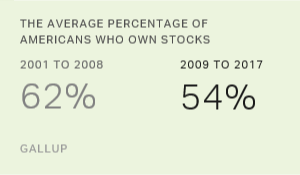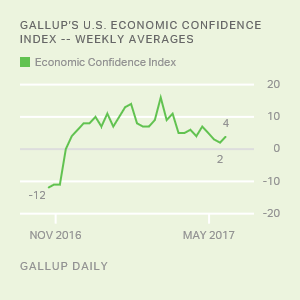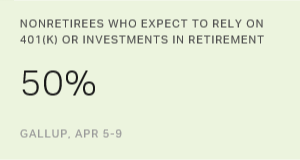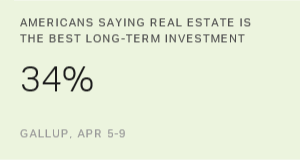Story Highlights
- Stock ownership has dropped to 54% from 62% since financial crisis
- Most major subgroups show lower ownership rates
- No decline among upper-income, older Americans
WASHINGTON, D.C. -- U.S. stock ownership remains below where it was before the financial crisis in the fall of 2008, with declines since then evident among most major subgroups of the population. Adults aged 65 and older and those with an annual household income of $100,000 or more are two groups whose ownership rates have held firm.
| 2001 to 2008 | 2009 to 2017 | Change | ||||||||||||||||||||||||||||||||||||||||||||||||||||||||||||||||||||||||||||||||||||||||||||||||||
|---|---|---|---|---|---|---|---|---|---|---|---|---|---|---|---|---|---|---|---|---|---|---|---|---|---|---|---|---|---|---|---|---|---|---|---|---|---|---|---|---|---|---|---|---|---|---|---|---|---|---|---|---|---|---|---|---|---|---|---|---|---|---|---|---|---|---|---|---|---|---|---|---|---|---|---|---|---|---|---|---|---|---|---|---|---|---|---|---|---|---|---|---|---|---|---|---|---|---|---|---|
| % | % | pct. pts. | ||||||||||||||||||||||||||||||||||||||||||||||||||||||||||||||||||||||||||||||||||||||||||||||||||
| U.S. adults | 62 | 54 | -8 | |||||||||||||||||||||||||||||||||||||||||||||||||||||||||||||||||||||||||||||||||||||||||||||||||
| Annual household income | ||||||||||||||||||||||||||||||||||||||||||||||||||||||||||||||||||||||||||||||||||||||||||||||||||||
| Less than $30,000 | 27 | 21 | -6 | |||||||||||||||||||||||||||||||||||||||||||||||||||||||||||||||||||||||||||||||||||||||||||||||||
| $30,000 to $74,999 | 67 | 54 | -13 | |||||||||||||||||||||||||||||||||||||||||||||||||||||||||||||||||||||||||||||||||||||||||||||||||
| $75,000 to $99,999 | 85 | 75 | -10 | |||||||||||||||||||||||||||||||||||||||||||||||||||||||||||||||||||||||||||||||||||||||||||||||||
| $100,000+ | 88 | 89 | +1 | |||||||||||||||||||||||||||||||||||||||||||||||||||||||||||||||||||||||||||||||||||||||||||||||||
| Age | ||||||||||||||||||||||||||||||||||||||||||||||||||||||||||||||||||||||||||||||||||||||||||||||||||||
| 18 to 29 | 42 | 31 | -11 | |||||||||||||||||||||||||||||||||||||||||||||||||||||||||||||||||||||||||||||||||||||||||||||||||
| 30 to 49 | 71 | 62 | -9 | |||||||||||||||||||||||||||||||||||||||||||||||||||||||||||||||||||||||||||||||||||||||||||||||||
| 50 to 64 | 69 | 62 | -7 | |||||||||||||||||||||||||||||||||||||||||||||||||||||||||||||||||||||||||||||||||||||||||||||||||
| 65+ | 53 | 54 | +1 | |||||||||||||||||||||||||||||||||||||||||||||||||||||||||||||||||||||||||||||||||||||||||||||||||
| Gender | ||||||||||||||||||||||||||||||||||||||||||||||||||||||||||||||||||||||||||||||||||||||||||||||||||||
| Men | 65 | 56 | -9 | |||||||||||||||||||||||||||||||||||||||||||||||||||||||||||||||||||||||||||||||||||||||||||||||||
| Women | 59 | 52 | -7 | |||||||||||||||||||||||||||||||||||||||||||||||||||||||||||||||||||||||||||||||||||||||||||||||||
| Region | ||||||||||||||||||||||||||||||||||||||||||||||||||||||||||||||||||||||||||||||||||||||||||||||||||||
| East | 64 | 56 | -8 | |||||||||||||||||||||||||||||||||||||||||||||||||||||||||||||||||||||||||||||||||||||||||||||||||
| Midwest | 65 | 57 | -8 | |||||||||||||||||||||||||||||||||||||||||||||||||||||||||||||||||||||||||||||||||||||||||||||||||
| South | 58 | 50 | -8 | |||||||||||||||||||||||||||||||||||||||||||||||||||||||||||||||||||||||||||||||||||||||||||||||||
| West | 63 | 54 | -9 | |||||||||||||||||||||||||||||||||||||||||||||||||||||||||||||||||||||||||||||||||||||||||||||||||
| College graduate | ||||||||||||||||||||||||||||||||||||||||||||||||||||||||||||||||||||||||||||||||||||||||||||||||||||
| Yes | 83 | 78 | -5 | |||||||||||||||||||||||||||||||||||||||||||||||||||||||||||||||||||||||||||||||||||||||||||||||||
| No | 53 | 43 | -10 | |||||||||||||||||||||||||||||||||||||||||||||||||||||||||||||||||||||||||||||||||||||||||||||||||
| Race/Ethnicity | ||||||||||||||||||||||||||||||||||||||||||||||||||||||||||||||||||||||||||||||||||||||||||||||||||||
| Non-Hispanic whites | 66 | 60 | -6 | |||||||||||||||||||||||||||||||||||||||||||||||||||||||||||||||||||||||||||||||||||||||||||||||||
| Non-Hispanic blacks | 40 | 36 | -4 | |||||||||||||||||||||||||||||||||||||||||||||||||||||||||||||||||||||||||||||||||||||||||||||||||
| Hispanics | 51 | 37 | -14 | |||||||||||||||||||||||||||||||||||||||||||||||||||||||||||||||||||||||||||||||||||||||||||||||||
| Employed | ||||||||||||||||||||||||||||||||||||||||||||||||||||||||||||||||||||||||||||||||||||||||||||||||||||
| Yes | 71 | 64 | -7 | |||||||||||||||||||||||||||||||||||||||||||||||||||||||||||||||||||||||||||||||||||||||||||||||||
| No | 48 | 42 | -6 | |||||||||||||||||||||||||||||||||||||||||||||||||||||||||||||||||||||||||||||||||||||||||||||||||
| Married | ||||||||||||||||||||||||||||||||||||||||||||||||||||||||||||||||||||||||||||||||||||||||||||||||||||
| Yes | 75 | 69 | -6 | |||||||||||||||||||||||||||||||||||||||||||||||||||||||||||||||||||||||||||||||||||||||||||||||||
| No | 48 | 38 | -10 | |||||||||||||||||||||||||||||||||||||||||||||||||||||||||||||||||||||||||||||||||||||||||||||||||
| Have children under 18 | ||||||||||||||||||||||||||||||||||||||||||||||||||||||||||||||||||||||||||||||||||||||||||||||||||||
| Yes | 67 | 58 | -9 | |||||||||||||||||||||||||||||||||||||||||||||||||||||||||||||||||||||||||||||||||||||||||||||||||
| No | 59 | 52 | -7 | |||||||||||||||||||||||||||||||||||||||||||||||||||||||||||||||||||||||||||||||||||||||||||||||||
| Gallup | ||||||||||||||||||||||||||||||||||||||||||||||||||||||||||||||||||||||||||||||||||||||||||||||||||||
These findings are based on combined data from Gallup's annual Economy and Personal Finance survey, conducted each April and including more than 18,000 U.S. adults since 2001. The survey asks U.S. adults whether they personally or jointly have money invested in the stock market, including in individual stocks and stock market funds such as 401(k)s and individual retirement accounts (IRAs).
Before the 2008 financial crisis, 62% of U.S. adults, on average, said they owned stocks. Since then, the average has been 54%, including lows of 52% in 2013 and 2016. In Gallup's April 2017 update, 54% of Americans report having money invested in stocks.
The stock market lost more than half of its value during the bear market that coincided with the Great Recession and 2008 financial crisis, with many investors responding by taking their money out of the market. Although the stock market has more than made up for those losses, reaching record highs this year, Gallup's data indicate that fewer Americans today are in a position to benefit from those gains.
U.S. stock ownership rates are highly related to income, ranging from 21% among those with an annual household income of less than $30,000 to 89% among those with an income of $100,000 or more. Americans in all income groups below $100,000 are less likely to own stocks than they were from 2001 to 2008. This includes a drop of six percentage points among lower-income households, 13 points among middle-income households (annual income of $30,000 to $74,999) and 10 points among upper-middle-income households (annual income of $75,000 to $99,999).
Given that relatively few Americans in lower-income households invested in stocks before the 2008 financial crisis and upper-income households show no change in ownership, it follows that middle- and upper-middle-income households have largely driven the decline in stock ownership.
Stock ownership also varies by age, perhaps because middle-aged Americans are in their peak earning years. On average, 62% of U.S. adults aged 30 to 64 own stocks, compared with 31% of those aged 18 to 29 and 54% of those aged 65 and older. Older Americans are no less likely now to invest in the stock market than they were from 2001 to 2008, while younger age groups show declines of between seven and 11 percentage points.
This lack of decline among older adults could reflect that the leading edge of baby boomers (those born between 1946 and 1952) have moved into the 65+ age category since the 2008 crisis. As a generation, baby boomers -- all of whom were in their prime working years during the economic boom of the 1980s and 1990s, and many of whom likely had 401(k)s at work -- have above-average rates of stock ownership.
Implications
The stock market has performed well in 2017, but proportionately fewer Americans are benefiting from today's bull market than did so in bull markets before the financial crisis. The gains in stock values in recent years seem to have done little to persuade people who may have divested themselves of stocks to get back in the market.
Nor has the recovery encouraged new investors to join the market. Although young adults are understandably less likely than their elders to own stocks, the percentage of 18- to 29-year-olds investing is down 11 points since before the financial crisis.
It appears the financial crisis and recession may have fundamentally changed some Americans' views of stocks as an investment. The collapse in stock values in 2008 and 2009 seems to have left a greater impression on these people than the ongoing bull market that has followed it, as well as research showing the strong historical performance of stocks as a long-term investment.
Historical data are available in Gallup Analytics.
Survey Methods
Results for this Gallup poll are based on combined telephone interviews from Gallup's annual Economy and Personal Finance survey, conducted each April from 2001 through 2017. The combined sample is based on interviews with 18,336 randomly selected adults, aged 18 and older, living in all 50 U.S. states and the District of Columbia. For results based on the total sample of national adults, the margin of sampling error is ±1 percentage point at the 95% confidence level.
All reported margins of sampling error include computed design effects for weighting.
View survey methodology, complete question responses and trends.
Learn more about how the Gallup Poll Social Series works.




